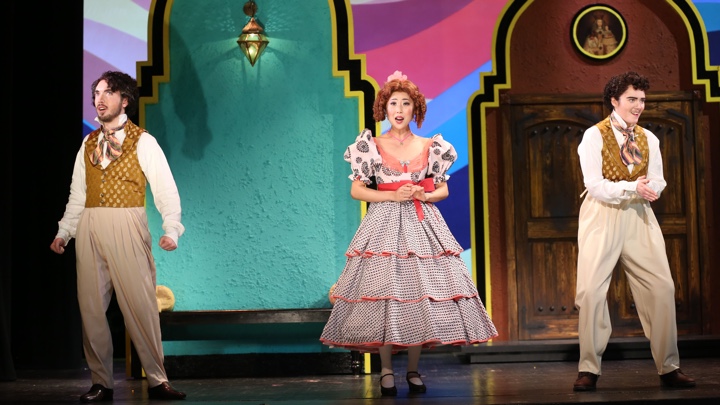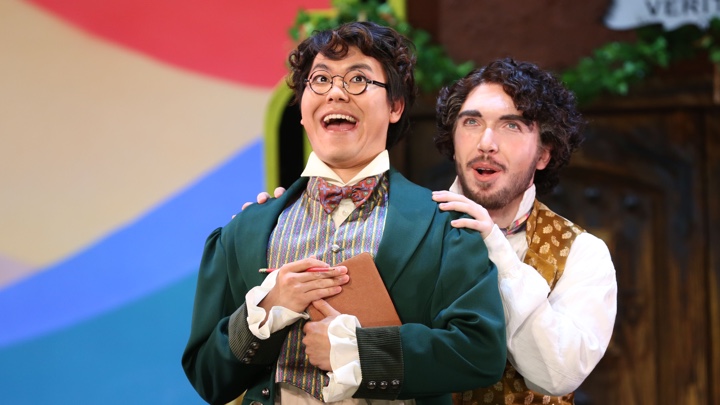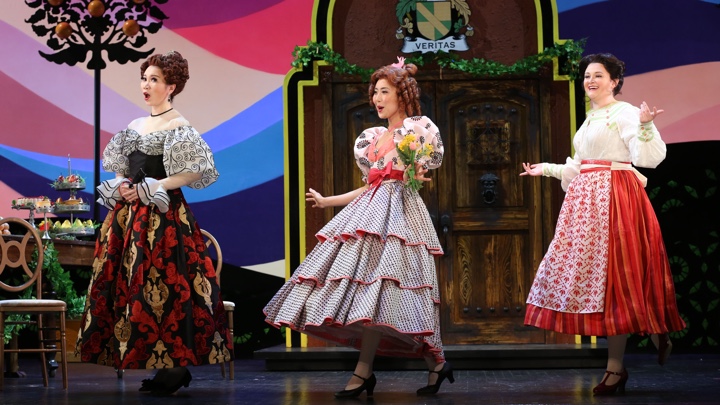
Once he sat down to write it, the plot went in ten other directions and the characters evolved accordingly. A generation later, when he tried to write a third part, La mère coupable, the play was a failure and its operatic settings have never made much stir.
But this was before copyright, and other playwrights were happy to devise new adventures for the world’s most famous barber. A certain Honoré Richard-Martelly—yes, that Honoré Richard-Martelly!—the famous one—okay, I’ve never heard of him either—wrote Les deux Figaros, and Felice Romani—yes, that Felice Romani—we all know him—turned it into a libretto, and several composers set it to music.
One of them was Saverio Mercadante, who composed some sixty operas between 1820 and 1870. At one point, he was hired to go to Madrid to take over their (Italian) opera company, and I due Figaro seemed just the vehicle. Every important capital city in Europe had an Italian opera company back then. Italy had several capital cities as well. It was a golden age.
Mercadante wrote light operas on the side, as it were. He was better known for grand operas that rivaled Donizetti and Verdi in melodious popularity—he was, however, a bit less particular in driving the action to a tingling climax than his rivals. He is best known for Il Giuramento (roughly the same story as La Gioconda), Il Reggente (same story as Un ballo in Maschera but set in Scotland), Il Bravo (given at Wexford last year), Medea, Gli Orazi ed i Curiazi and Virginia.
All these operas are beginning to show up on the bel canto revival circuit, but only Giuramento has been heard in New York in the last generation, once at Juilliard and once by Opera Orchestra of New York.

The plot may puzzle you if you are deeply bound to these characters as Mozart set them. Here, fifteen years later, are the Count and Countess (mature and indifferent to each other), Figaro and Susanna (whose marriage has become a brittle one), and Cherubino.
Cherubino has grown up into a handsome colonel of a regiment—but he still sings mezzo-soprano. And whatever he may have felt for the Countess as a boy, he is now in love with her daughter, Inez. The Countess and Susanna are all for the match—but Figaro, the villain in this opera, wants Inez to marry a crony of his who is posing as a nobleman. Then they can split the dowry.
The only one of these characters one actually cares about is Cherubino whom, mysteriously, neither the Count nor Figaro recognizes. Asked his name, the colonel-in-disguise says, “Figaro,” and claims to be the barber’s brother. There’s a distinct resemblance, thanks to MSM’s clever wigmaker, Bobbie Zlotnik, and the witty costumes of Tracy Dorman.
The barber doesn’t remember having a brother, but that’s not the trouble. Neither is Cherubino’s claim, when he is caught plotting with Susanna, that he’s merely attempting to seduce her. (Doesn’t everyone?) The trouble is that we don’t really know or believe in anybody here. Mozart and Donizetti could humanize characters in a farce—Mercadante cannot get a handle on them.
If you can get past that, there is much melodious pleasure to be had. There are duets at cross purposes (always fun); a conspiracy trio for the ladies; a busy Act I finale with everyone in confusion; castanettish rhythms (unlike Mozart and Rossini, Mercadante actually went to Spain, where the opera premiered in 1835); and a bedroom with two locked closets and someone concealed in each. Figaro’s devious plans go bust, but his conniving went bust in Nozze too—it was the ladies’ plans that worked out so well in Mozart’s opera, remember.

Too, the thousands of comic operas that once flooded the lyric stage and await rediscovery seldom contain music that would strain immature voices, as grander works well may do. For the staff, there are no clichés to fall back upon—they’ve got to invent everything from scratch, which at MSM meant Shoko Kambara’s handsome set with one central double-door plus a pair of moveable arbors that could spin to become Susanna’s closets. I believe the director, Dona D. Vaughn, borrowed the crazy Act I finale from Ponnelle, but it’s still funny.
There were two casts; I caught the second. In both, I gather, Cherubino was the starring role. That meant Alanna Fraize for me, a tall figure, comfortable on stage, with an easy mezzo of attractive quality. Her/his (their?) twin was Evan Lazdowski, the Figaro, whose scowl alternated with a complicit grin, and whose well-grounded bass-baritone had, unfortunately, no lengthy solo to explain his schemes—Lazdowski looked like he’d contrive the hell out of it.
Jiyu Kim sang Inez, whose one aria implied a Susanna in her future: a sweet hall-filling meditation, evenly produced, on her hopes of true love. In contrast, Blair Cagney, who sang Picker’s Emmeline last spring, was rather an acid-voiced Susanna, with some very loud notes that did not quite fit into the line of her song, and Xiao Xiao, the Countess, had an undistinguished aria but no character to play.
The Count in this opera is simply present to froth foolishly as everyone hoodwinks or manipulates him. Tenor Yu Ding has the right authority thanks to a remarkably sizable voice and excellent Italian diction, but subtlety and softer emotions should not have evaded his grasp. Daniel Choi performed well in the makeweight part of an itinerant poet who is hoping Figaro will invent him the plot of a successful farce. Isn’t he left over from Il Turco in Italia, another Romani libretto? Well, he gives us another baritone in the ensembles.
Stefano Sarzani seemed a bit tentative leading the Manhattan School orchestra through the overture—shouldn’t Spanish dances have more snap?—but once the curtain rose, he held the various complicated forces together very well, giving us pleasant tunes to hum and no time to think about whether the story meant anything. (Always advisable in farce!)
Photo credit: Carol Rosegg


